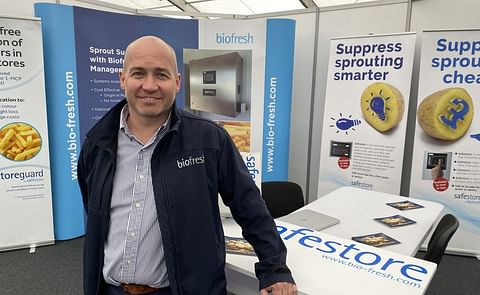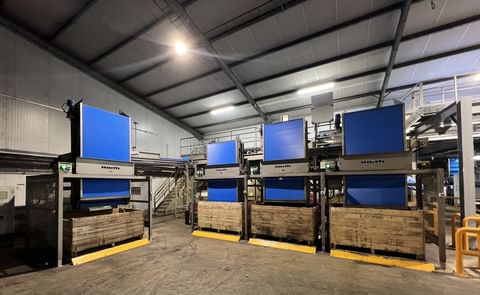Innate Generation 2 potatoes survive in field infected with late blight at Michigan State University (Courtesy: J.R. Simplot)
Genetically engineered potatoes approved for Maine

With little fanfare, the Maine Board of Pesticides Control unanimously approved on Friday morning the registration of three new types of genetically engineered potatoes that have been developed by a major Idaho agribusiness company.
The move means that the J.R. Simplot Co.’s Russet Burbank, Ranger Russet and Atlantic potatoes could be planted in Maine fields at any time.
These potatoes were created by adding genes from a wild potato plant and are designed to be resistant to late blight, the disease that caused the mid-19th century Irish Potato Famine and which remains a problem today.
But genetically modified crops have been controversial in the past. Critics of the process say that won’t be any different for the Simplot potatoes, the second generation to be sold under the brand name Innate, although company officials say otherwise.
Sharie Fitzpatrick, a senior biotech regulatory manager at Simplot:
Jim Gerritsen of Wood Prairie Family Farm:
“It’s a different type of product,” Fitzpatrick told the pesticide board members before they voted on accepting the potatoes. Maine is the last state in the country to approve the potatoes.
It is unclear whether Maine farmers will be interested in planting these potatoes. Companies that sell potato products internationally steer clear of genetically engineered plants, according to board members.
But because late blight is a disease that is present in Maine potato fields, a product which allows farmers to sharply curtail fungicide application might be desirable, board members said.
The move means that the J.R. Simplot Co.’s Russet Burbank, Ranger Russet and Atlantic potatoes could be planted in Maine fields at any time.
These potatoes were created by adding genes from a wild potato plant and are designed to be resistant to late blight, the disease that caused the mid-19th century Irish Potato Famine and which remains a problem today.
But genetically modified crops have been controversial in the past. Critics of the process say that won’t be any different for the Simplot potatoes, the second generation to be sold under the brand name Innate, although company officials say otherwise.
Sharie Fitzpatrick, a senior biotech regulatory manager at Simplot:
“Once people understand that it’s [potato-to-potato], they soften.”However, Jim Gerritsen of Wood Prairie Family Farm in Bridgewater, who sells organically grown seed potatoes to customers in all 50 states from his Aroostook County farm and who has been a longtime opponent of genetically engineered crops, disagrees.
“It doesn’t hit the same sort of emotional triggers.”
Jim Gerritsen of Wood Prairie Family Farm:
“These GMO potatoes run the very strong risk of depressing demand for potatoes of all types, both organic and conventional.”The Innate potatoes have been in development for more than a dozen years, Fitzpatrick said, and have been ruled safe by the U.S. Food and Drug Administration and approved last fall by the United States Department of Agriculture. According to information provided by the Simplot company, the Russet Burbank, Ranger Russet and Atlantic varieties of potato provide benefits to growers, processors and consumers that include reduced bruising, protection from late blight pathogens and enhanced cold storage capability.
“There’s a growing body of evidence that consumers do not want genetically engineered food. What I worry about is that there will be a vague recollection that new potatoes will be genetically engineered.”
“That’s going to damage every potato farmer. Not just organic ones but regular ones, too.”
“It’s a different type of product,” Fitzpatrick told the pesticide board members before they voted on accepting the potatoes. Maine is the last state in the country to approve the potatoes.
It is unclear whether Maine farmers will be interested in planting these potatoes. Companies that sell potato products internationally steer clear of genetically engineered plants, according to board members.
But because late blight is a disease that is present in Maine potato fields, a product which allows farmers to sharply curtail fungicide application might be desirable, board members said.
Like to receive news like this by email? Join and Subscribe!
NEW! Join Our BlueSky Channel for regular updates!
Highlighted Company
Sponsored Content
Sponsored Content
Sponsored Content
Sponsored Content
Sponsored Content









